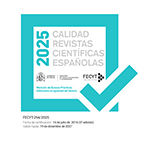Literatura, memoria e identidad. Una aproximación teórica
Resumen
La estrecha relación que manifiestan la memoria, en cuanto hecho de recordar, y la identidad, en cuanto conjunto de rasgos y circunstancias que definen y diferencian a una persona o a un grupo social, es un tema recurrente en la literatura contemporánea, no sólo en España, sino también en otros países que en su historia reciente han sufrido cambios sociopolíticos profundos, como es el caso de Alemania. Sobre todo la narrativa actual tiende a plastar estéticamente el proceso de recuerdo y olvido que emprenden determinados individuos o colectivos, a fin de recrear, a través de sus particulares visiones del pasado, unas identidades imaginadas. Recurriendo a determinados procesos formales, esta narrativa moldea, de manera diversa, diferentes conceptos y formas de construcción de la memoria y la identidad, y proyecta, a veces someramente, otras veces con sorprendente prolijidad, unos modelos identitarios con una significativa carga simbólica, que bien pueden influir de manera determinante en las modalidades que adoptan en la sociedad contemporánea los procesos individuales y colectivos de evocación del pasado y de construcción de identidades. En el presente estudio se realizará un acercamiento teórico a los conceptos de memoria e identidad y a la función específica que cumple la literatura en su articulación.
Descargas
Descarga artículo
Licencia
La Revista de Filología Alemana, para fomentar el intercambio global del conocimiento, facilita el acceso sin restricciones a sus contenidos desde el momento de su publicación en la presente edición electrónica, y por eso es una revista de acceso abierto. Los originales publicados en esta revista son propiedad de la Universidad Complutense de Madrid y es obligatorio citar su procedencia en cualquier reproducción total o parcial. Todos los contenidos se distribuyen bajo una licencia de uso y distribución Creative Commons Reconocimiento 4.0 (CC BY 4.0). Esta circunstancia ha de hacerse constar expresamente de esta forma cuando sea necesario. Puede consultar la versión informativa y el texto legal de la licencia.










